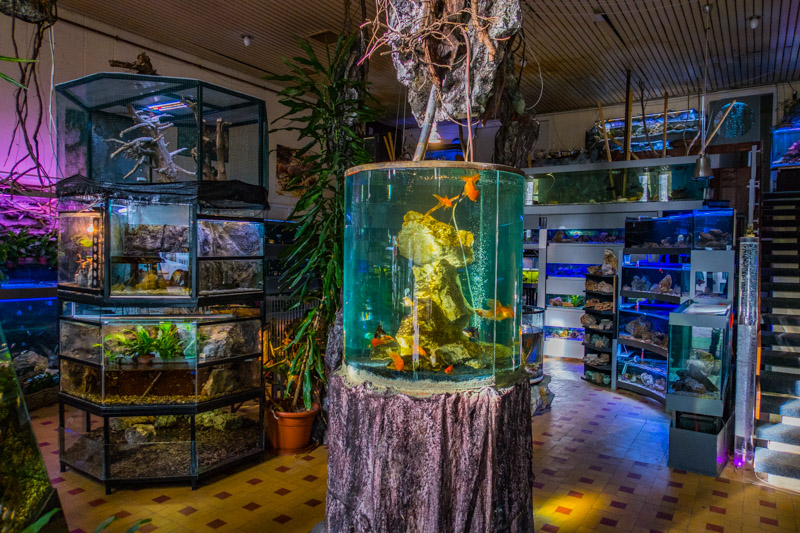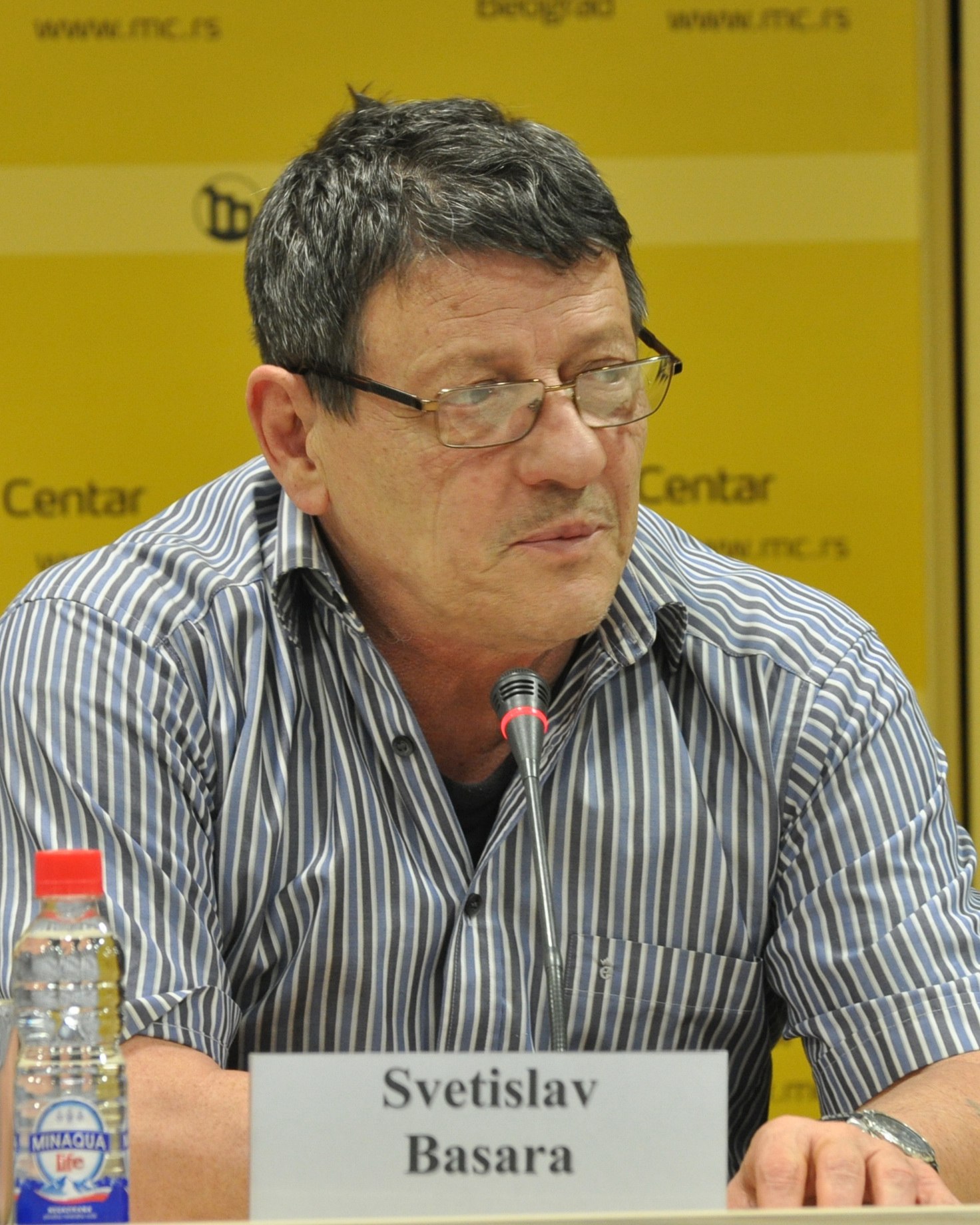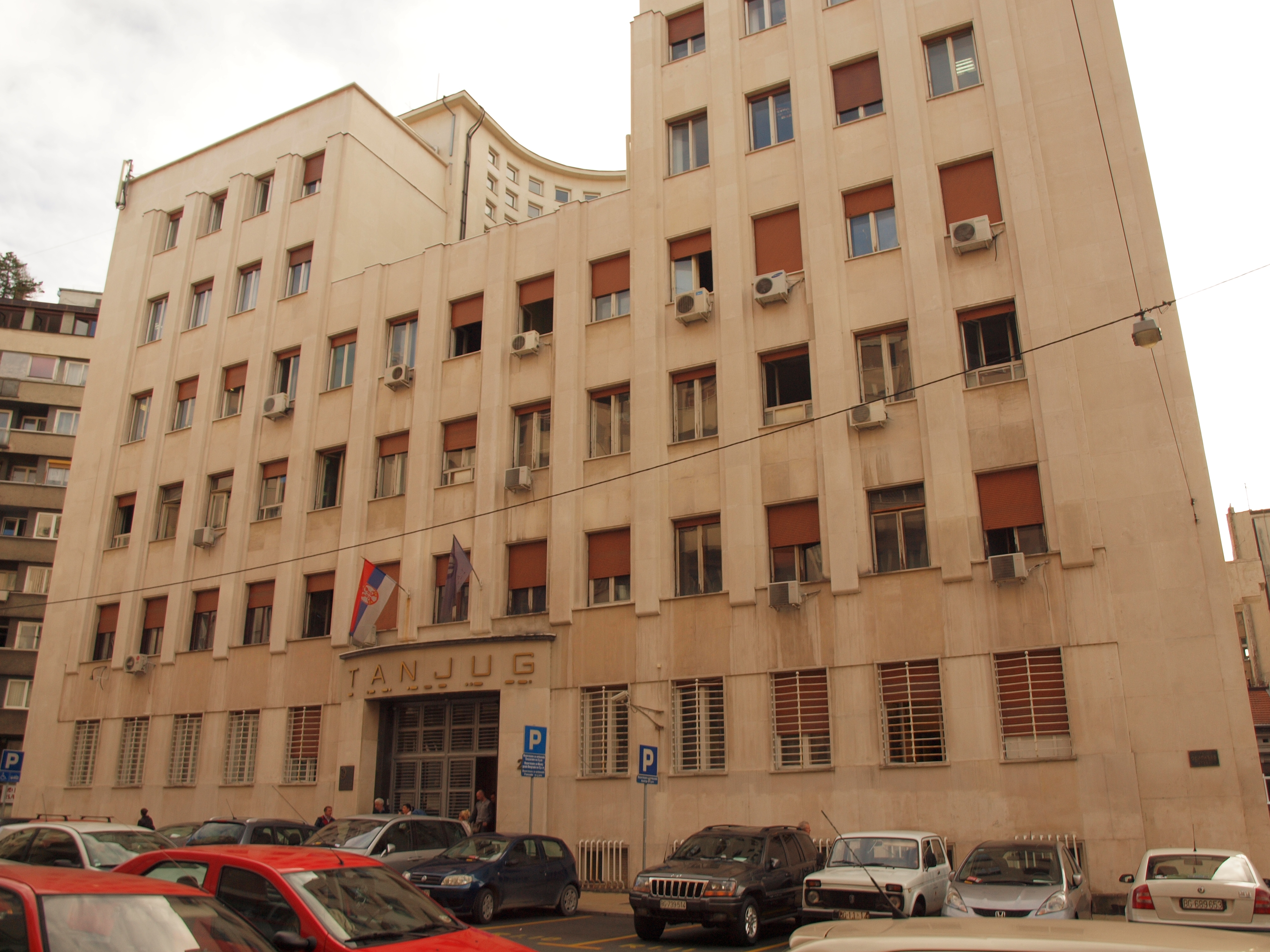|
Jara Ribnikar
Jara Ribnikar ( sr-cyr, Јара Рибникар; born Jaroslava Hájková; 23 August 1912 — 30 April 2007) was Yugoslavian and Serbian writer, translator, partisan fighter and politician. She was the second wife of Vladislav S. Ribnikar, journalist and editor-in-chief of Politika, member of the prominent Ribnikar family. She wrote novels, memoires, short stories and poems. Jara Ribnikar was vice-president of the Serbian Literary Guild, president of Serbian (1966-1980) and Yugoslavian PEN Centres and member of the Council of Peoples of the Federal People's Assembly. Biography Ribnikar was born Jaroslava Hájková in Hradec Králové in Bohemia, her father was pianist and composer Emil Hájek. The family moved to Belgrade, Yugoslavia, when Ribnikar was a child. In Belgrade, she married Vladislav S. Ribnikar, one of the owners of the Politika newspapers. In the interwar Yugoslavia, Vladislav supported the clandestine Communist Party of Yugoslavia. In 1941, the meeting of the com ... [...More Info...] [...Related Items...] OR: [Wikipedia] [Google] [Baidu] |
Yugoslavia
Yugoslavia (; sh-Latn-Cyrl, separator=" / ", Jugoslavija, Југославија ; sl, Jugoslavija ; mk, Југославија ;; rup, Iugoslavia; hu, Jugoszlávia; rue, label=Pannonian Rusyn, Югославия, translit=Juhoslavija; sk, Juhoslávia; ro, Iugoslavia; cs, Jugoslávie; it, Iugoslavia; tr, Yugoslavya; bg, Югославия, Yugoslaviya ) was a country in Southeast Europe and Central Europe for most of the 20th century. It came into existence after World War I in 1918 under the name of the ''Kingdom of Serbs, Croats and Slovenes'' by the merger of the provisional State of Slovenes, Croats and Serbs (which was formed from territories of the former Austria-Hungary) with the Kingdom of Serbia, and constituted the first union of the South Slavic people as a sovereign state, following centuries in which the region had been part of the Ottoman Empire and Austria-Hungary. Peter I of Serbia was its first sovereign. The kingdom gained international recog ... [...More Info...] [...Related Items...] OR: [Wikipedia] [Google] [Baidu] |
Dedinje
Dedinje ( sr-cyrl, Дедиње, ) is an urban neighborhood of Belgrade, the capital of Serbia. It is located in Belgrade's municipality of Savski Venac. Dedinje is generally considered the wealthiest part of Belgrade, and is the site of numerous villas and mansions owned by the members of the city's plutocracy, as well as many diplomatic residences. Location Dedinje is located on the eastern slopes of the hill of Topčidersko Brdo, 7-8 kilometers south of downtown Belgrade to which it is connected by the '' Kneza Miloša street''. It borders the neighborhoods of Senjak (west), Prokop and Mostar (north), Stadion and Diplomatska Kolonija (actually, Dedinje's sub-neighborhood; east), Banjica, Lisičji Potok and Topčider (south). It is well connected to the other parts of Belgrade by several boulevards (of ''Prince Aleksandar Karađorđević'', '' Vojvoda Putnik'') and broad streets ('' Teodora Drajzera'', ''Neznanog junaka'', etc.). Main street in the neighborhood itself is ... [...More Info...] [...Related Items...] OR: [Wikipedia] [Google] [Baidu] |
People From Hradec Králové
A person ( : people) is a being that has certain capacities or attributes such as reason, morality, consciousness or self-consciousness, and being a part of a culturally established form of social relations such as kinship, ownership of property, or legal responsibility. The defining features of personhood and, consequently, what makes a person count as a person, differ widely among cultures and contexts. In addition to the question of personhood, of what makes a being count as a person to begin with, there are further questions about personal identity and self: both about what makes any particular person that particular person instead of another, and about what makes a person at one time the same person as they were or will be at another time despite any intervening changes. The plural form "people" is often used to refer to an entire nation or ethnic group (as in "a people"), and this was the original meaning of the word; it subsequently acquired its use as a plural form of per ... [...More Info...] [...Related Items...] OR: [Wikipedia] [Google] [Baidu] |
2007 Deaths
This is a list of deaths of notable people, organised by year. New deaths articles are added to their respective month (e.g., Deaths in ) and then linked here. 2022 2021 2020 2019 2018 2017 2016 2015 2014 2013 2012 2011 2010 2009 2008 2007 2006 2005 2004 2003 2002 2001 2000 1999 1998 1997 1996 1995 1994 1993 1992 1991 1990 1989 1988 1987 See also * Lists of deaths by day The following pages, corresponding to the Gregorian calendar, list the historical events, births, deaths, and holidays and observances of the specified day of the year: Footnotes See also * Leap year * List of calendars * List of non-standard ... * Deaths by year {{DEFAULTSORT:deaths by year ... [...More Info...] [...Related Items...] OR: [Wikipedia] [Google] [Baidu] |
1912 Births
Year 191 ( CXCI) was a common year starting on Friday (link will display the full calendar) of the Julian calendar. At the time, it was known as the Year of the Consulship of Apronianus and Bradua (or, less frequently, year 944 ''Ab urbe condita''). The denomination 191 for this year has been used since the early medieval period, when the Anno Domini calendar era became the prevalent method in Europe for naming years. Events By place Parthia * King Vologases IV of Parthia dies after a 44-year reign, and is succeeded by his son Vologases V. China * A coalition of Chinese warlords from the east of Hangu Pass launches a punitive campaign against the warlord Dong Zhuo, who seized control of the central government in 189, and held the figurehead Emperor Xian hostage. After suffering some defeats against the coalition forces, Dong Zhuo forcefully relocates the imperial capital from Luoyang to Chang'an. Before leaving, Dong Zhuo orders his troops to loot the tombs of the H ... [...More Info...] [...Related Items...] OR: [Wikipedia] [Google] [Baidu] |
University Hospital Center Dr Dragiša Mišović
University Hospital Center Dr Dragiša Mišović ( sr, Клиничко-болнички центар Др Драгиша Мишовић-Дедиње) or Clinical Hospital Center Dr Dragiša Mišović Dedinje, is a health facility of secondary level in Belgrade, that performs specialist health care in its hospitals and clinics. It is based on modern principles of health care.''Vizija i misija'' ''DragisaMisovic.bg.ac.rs'' KBC Dr Dragiša Mišović. It serves as a teaching facility of the . It was established in 1930, and it is named after Dragiša Mišović, a pre– ... [...More Info...] [...Related Items...] OR: [Wikipedia] [Google] [Baidu] |
Yugoslav Left
The Yugoslav Left ( sr, Југословенска Левица, Jugoslovenska Levica; abbr. ЈУЛ, JUL) was a far-left political party in the Federal Republic of Yugoslavia. At its peak, the party had 20 seats in Republic of Serbia's National Assembly following the 1997 general election. Ideology JUL declared itself to be a party of all "left-wing and progressive forces that believed that the general interest always comes above private interest", including communists, socialists, greens, social democrats, and democratic socialists. History The party was formed in 1994 by merging 19 left-wing parties, led by the League of Communists – Movement for Yugoslavia (SK-PJ). It was led by Mirjana Marković, originally holding the title of President of the Directorate. Unlike the Socialist Party of Serbia (SPS) and its ally the Democratic Party of Socialists of Montenegro (DPS) which were direct descendants of the League of Communists of Serbia and Montenegro respectively, the Yugos ... [...More Info...] [...Related Items...] OR: [Wikipedia] [Google] [Baidu] |
Slobodan Milošević
Slobodan Milošević (, ; 20 August 1941 – 11 March 2006) was a Yugoslav and Serbian politician who was the president of Serbia within Yugoslavia from 1989 to 1997 (originally the Socialist Republic of Serbia, a constituent republic of the Socialist Federal Republic of Yugoslavia, from 1989 to 1992) and president of the Federal Republic of Yugoslavia from 1997 to 2000. Formerly a high-ranking member of the League of Communists of Serbia (SKS) during the 1980s, he led the Socialist Party of Serbia from its foundation in 1990 until 2003. Born in Požarevac, he studied law at the University of Belgrade Faculty of Law and joined the League of Socialist Youth of Yugoslavia as a student. During the 1960s he served as an advisor to mayor of Belgrade Branko Pešić, and was later appointed chairman of Tehnogas and Beobanka, roles which he served until the 1980s. Milošević rose to power in 1987 by promoting populist and nationalist views, arguing for the reduction of power of S ... [...More Info...] [...Related Items...] OR: [Wikipedia] [Google] [Baidu] |
Transcendental Meditation
Transcendental Meditation (TM) is a form of silent mantra meditation advocated by the Transcendental Meditation movement. Maharishi Mahesh Yogi created the technique in India in the mid-1950s. Advocates of TM claim that the technique promotes a state of relaxed awareness, stress relief, and access to higher states of consciousness, as well as physiological benefits such as reducing the risk of heart disease and high blood pressure. Building on the teachings of his master Brahmananda Saraswati (known honorifically as Guru Dev), the Maharishi taught thousands of people during a series of world tours from 1958 to 1965, expressing his teachings in spiritual and religious terms. TM became more popular in the 1960s and 1970s, as the Maharishi shifted to a more technical presentation, and his meditation technique was practiced by celebrities, most prominently members of the Beatles and the Beach Boys. At this time, he began training TM teachers and created specialized organizations t ... [...More Info...] [...Related Items...] OR: [Wikipedia] [Google] [Baidu] |
NIN Award
The ''NIN'' Award ( sr, Ninova nagrada, italics=yes, Нинова награда), officially the Award for Best Novel of the Year, is a prestigious Serbian (and previously Yugoslavian) literary award established in 1954 by the ''NIN'' weekly and is given annually for the best newly published novel written in Serbian (previously in Serbo-Croatian).B92''Grozdani Olujić NIN-ova nagrada'' (NIN Prize to Grozdana Olujić) 15 Jan 2010 The award is presented every year in January by a panel of writers and critics. In addition to being a highly acclaimed award capable of transforming writers' literary careers, the award is also sought after because it virtually assures bestseller status for the winning novel. The literary website '' complete review'' called it the "leading Serbian literary prize" in 2012. Between 1954 and 1957, the award was given to the best novel published in Yugoslavia, regardless of the language, but all the novels awarded in this period were written in Serbo-Cro ... [...More Info...] [...Related Items...] OR: [Wikipedia] [Google] [Baidu] |
TANJUG
Tanjug (/'tʌnjʊg/) ( sr-cyr, Танјуг; sometimes stylized as TANJUG) was a Serbian state news agency based in Belgrade, which officially ceased to exist in March 2021. Since then, Belgrade based private company Tanjug Tačno, acquired the rights to use the intellectual property rights and trademarks of the former agency. History Founded on 5 November 1943 as Yugoslavia's official news agency, its name is an acronym of its full original native name '' Telegrafska agencija nove Jugoslavije'' ("Telegraphic Agency of New Yugoslavia"). From 1975 to the mid-1980s, Tanjug had a leading role in the Non-Aligned News Agencies Pool (NANAP), a collaborating group of news agencies of the Non-Aligned Movement (NAM). Tanjug professionals helped equip and train journalists and technicians of state media in other NAM countries, mainly in Africa and South Asia. On 31 October 2015, according to media reports, Tanjug ceased its operations due to financial problems. Soon after, state secreta ... [...More Info...] [...Related Items...] OR: [Wikipedia] [Google] [Baidu] |
Moša Pijade
Moša Pijade ( sr-Cyrl, Мoшa Пијаде; he, משה פיאדה; alternate English transliteration Moshe Piade; 4 January 1890 – 15 March 1957), nicknamed Čiča Janko (, lit. "Old Man Janko") was a Serbian and Yugoslav communist of Jewish origin, a close collaborator of Josip Broz Tito, Yugoslav politician, and full member of the Serbian Academy of Sciences and Arts. Life and career Pijade was of Sephardic Jewish parentage. In his youth, Pijade was a painter, art critic and publicist. He was also known for translating ''Das Kapital'' by Karl Marx into Serbo-Croatian, together with Rodoljub Čolaković. He is thought to have had a major influence on Marxist ideology as exposed during the ''old regime'' in the Kingdom of Yugoslavia. In 1925, he was sentenced to 20 years in prison because of his 'revolutionary activities' after World War I. He was discharged after 14 years in 1939 and imprisoned again in 1941 in the camp Bileća. World War II Pijade was one of the ... [...More Info...] [...Related Items...] OR: [Wikipedia] [Google] [Baidu] |

_1938.jpg)



